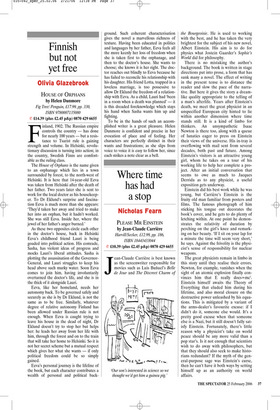Finnish but not yet free
Olivia Glazebrook
HOUSE OF ORPHANS by Helen Dunmore Fig Tree/ Penguin, £17.99, pp. 330, ISBN 9780007135080 ✆ £14.39 (plus £2.45 p&p) 0870 429 6655 Finland, 1902. The Russian empire controls the country — has done for nearly 100 years — but a resistance to Tsarist rule is gaining strength and volume. In Helsinki, revolutionary discussion is turning into action; in the country, Swedish Finns are comfortable as the ruling class.
The House of Orphans is the name given to an orphanage which lies in a town surrounded by forest, to the north-west of Helsinki. It is here that 14-year-old Eeva was taken from Helsinki after the death of her father. Two years later she is sent to work for the local doctor as his housekeeper. To Dr Eklund’s surprise and fascination Eeva is much more than she appears: ‘They’d taken her away and tried to make her into an orphan, but it hadn’t worked. She was still Eeva. Inside her, where the jewel of her father’s anger burned.’ As these two opposites circle each other in the doctor’s house, back in Helsinki Eeva’s childhood friend Lauri is being goaded into political action. His comrade, Sasha, has violent ideas of progress and mocks Lauri’s liberal attitudes. Sasha is plotting the assassination of the GovernorGeneral, and Lauri struggles to keep his head above such murky water. Soon Eeva comes to join him, having involuntarily overturned the doctor’s life, and she is in the thick of it alongside Lauri.
Eeva, like her homeland, needs her autonomy back. To be governed safely and securely as she is by Dr Eklund, is not the same as to be free. Similarly, whatever degree of relative autonomy Finland has been allowed under Russian rule is not enough. When Eeva is caught trying to leave his house in the dead of night, Dr Eklund doesn’t try to stop her but helps her: he leads her away from her life with him, through the forest and on to the train that will take her home to Helsinki. So it is not her secret scheme but a mutual respect which gives her what she wants — if only political freedom could be so simply gained.
Eeva’s personal journey is the lifeline of the book, but each character contributes a wealth of personal and political back ground. Such coherent characterisation gives the novel a marvellous richness of texture. Having been educated in politics and languages by her father, Eeva feels all the more keenly her loss of freedom when she is taken first to the orphanage, and then to the doctor’s house. She wants to choose; she knows it is her right. The doctor reaches out blindly to Eeva because he has failed to reconcile his relationship with his daughter. His friend Lotta, trapped in a loveless marriage, is too possessive to allow Dr Eklund the freedom of a relationship with Eeva. As a child, Lauri had ‘been in a room when a death was planned’ — it is this dreaded foreknowledge which stays his hand when Sasha wants him up and fighting.
To be in the hands of such an accomplished writer is a great pleasure. Helen Dunmore is confident and precise in her evocation of place and of feeling. Her characters are perfectly distinct in their wants and frustrations; as she slips from voice to voice it is easy to follow her, since each strikes a note clear as a bell.


































































 Previous page
Previous page